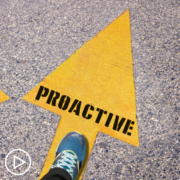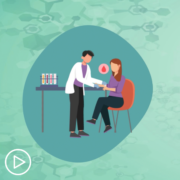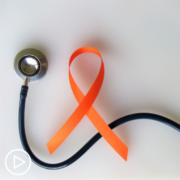What Is the Role of a Care Partner in Bispecific Antibody Therapy?
What Is the Role of a Care Partner in Bispecific Antibody Therapy? from Patient Empowerment Network on Vimeo.
How can a myeloma care partner support a bispecific antibody therapy patient? Nurse practitioner Alexandra Distaso from Dana-Farber Cancer Institute explains ways that care partners can offer logistical and emotional support and shares tips for staying well-informed and organized during the treatment journey.
Alexandra Distaso, MSN, FNP-BC is on the Multiple Myeloma Nursing Team at Dana-Farber Cancer Institute.
See More from The Care Partner Toolkit: Bispecific Antibodies
Related Resources:

How Can Bispecific Antibody Therapy Care Partners Be Proactive? |

|

Bispecific Antibody Therapy Support | Care Team Members and Resources |
Transcript:
Katherine:
As I mentioned, Alexandra, this program is aimed at helping care partners understand the process and how they can support their loved ones. What do you feel is the care partner’s role?
Alexandra:
I feel like the best way for care partners to support patients is to kind of take the time to learn about the myeloma and the therapy and try to do the best they can to just be there for not just moral and emotional support, but the other little things that they may need. Coordinating rides, if it’s a family member, asking friends for help.
And then other things like insurance phone calls can be incredibly time-consuming and taxing. Or waiting at the pharmacy to pick up medications. Any, even little things like that, I think take a huge load off the patients who are doing this day in and day out.
Katherine:
Yeah. Are there key questions that care partners should ask as they begin the process?
Alexandra:
I think the best thing that patients and caregivers can do is if they have questions prior to the visit is to make a list. ‘Cause, I’m guilty of this myself, as soon as I show up at my doctor’s office, I completely forget what I wanted to say. So, making a list prior to the appointment, I think, is hugely beneficial. And then I don’t think that it’s ever a bad thing to ask for the doctor or nurse practitioner or pharmacist, whoever you’re meeting with, to see if they can repeat themselves. We’re putting a lot of information into a very short period of time.
And to try and keep track of, again, schedule, supportive care medication, when you’re going to need to be in the hospital, how long, what your follow-up will be, taking notes during the visit or asking to hear it again is always helpful. Not even just for the caregiver, but sometimes for the patient who’s still trying to wrap their head around some of the change in therapy.
Katherine:
Right. Yeah. That’s really good advice. As we’ve covered, it’s not always easy being a care partner. What would be your best advice for those who are caring for someone undergoing bispecific antibody treatment?
Alexandra:
I would say it’s hard to put out how important care members are to the entire care team. Again, not just for the logistical, getting the patients to appointments, getting their medication, but really having someone the patient feels comfortable to be able to lean on. And again, they may say, “I’m so overwhelmed in these visits, and I really need some help.
Could you ask these things?” Helping them keep track of all these medication changes and appointments and visits and any sort of even small things like grabbing them a water so that they’re staying hydrated. Those little things make such a difference to people. And I think doing those things, no matter how small they feel, really helps support the patients through these changes in therapy.









